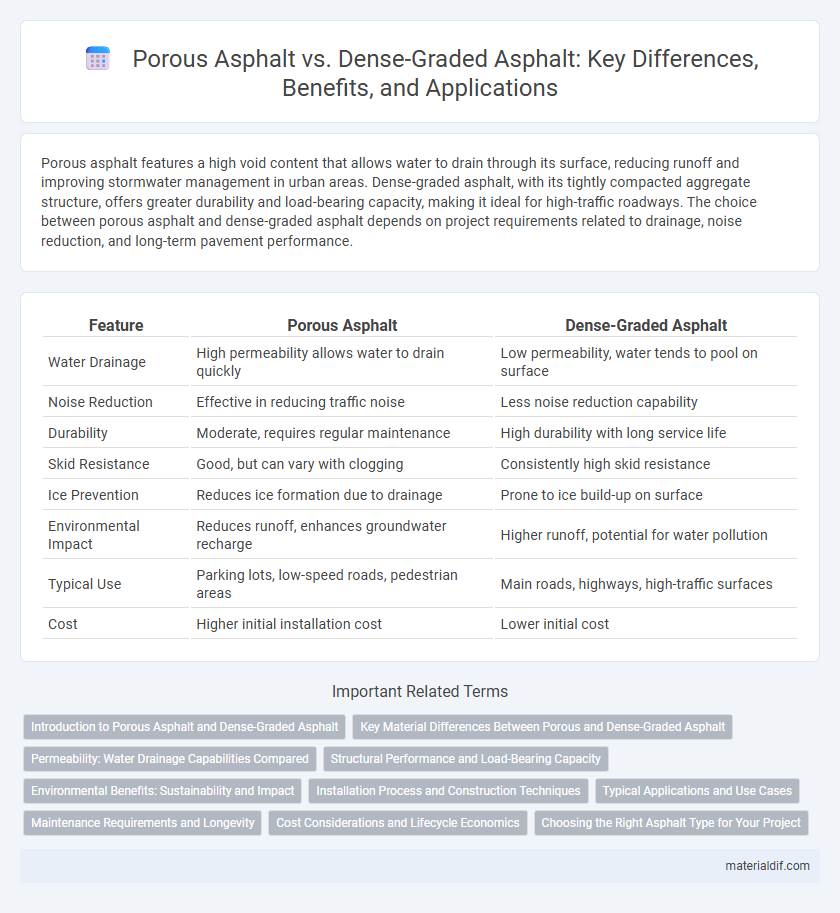Porous asphalt features a high void content that allows water to drain through its surface, reducing runoff and improving stormwater management in urban areas. Dense-graded asphalt, with its tightly compacted aggregate structure, offers greater durability and load-bearing capacity, making it ideal for high-traffic roadways. The choice between porous asphalt and dense-graded asphalt depends on project requirements related to drainage, noise reduction, and long-term pavement performance.
Table of Comparison
| Feature | Porous Asphalt | Dense-Graded Asphalt |
|---|---|---|
| Water Drainage | High permeability allows water to drain quickly | Low permeability, water tends to pool on surface |
| Noise Reduction | Effective in reducing traffic noise | Less noise reduction capability |
| Durability | Moderate, requires regular maintenance | High durability with long service life |
| Skid Resistance | Good, but can vary with clogging | Consistently high skid resistance |
| Ice Prevention | Reduces ice formation due to drainage | Prone to ice build-up on surface |
| Environmental Impact | Reduces runoff, enhances groundwater recharge | Higher runoff, potential for water pollution |
| Typical Use | Parking lots, low-speed roads, pedestrian areas | Main roads, highways, high-traffic surfaces |
| Cost | Higher initial installation cost | Lower initial cost |
Introduction to Porous Asphalt and Dense-Graded Asphalt
Porous asphalt features a high void content designed to allow water infiltration, reducing surface runoff and improving drainage on roadways and parking lots. Dense-graded asphalt consists of tightly packed aggregates that create a solid, impermeable surface known for durability and load-bearing capacity. Both asphalt types serve specific engineering needs, with porous asphalt enhancing stormwater management and dense-graded asphalt offering superior strength and longevity.
Key Material Differences Between Porous and Dense-Graded Asphalt
Porous asphalt features a high void content, typically ranging from 15% to 20%, allowing water to infiltrate through the pavement surface, whereas dense-graded asphalt has a much lower void content of around 4% to 8%, resulting in a denser, less permeable structure. Porous asphalt uses larger, uniformly graded aggregates to create interconnected air voids for enhanced drainage, while dense-graded asphalt employs a well-graded aggregate mix with finer particles filling void spaces for superior strength and durability. The binder content in porous asphalt is carefully balanced to coat aggregates without clogging voids, contrasting with dense-graded asphalt's higher binder content that improves cohesion and load-bearing capacity.
Permeability: Water Drainage Capabilities Compared
Porous asphalt features high permeability due to its interconnected void structure, allowing efficient water drainage and reducing surface runoff. Dense-graded asphalt has low permeability as its compact aggregate matrix limits water infiltration, often necessitating additional drainage systems. Enhanced permeability in porous asphalt significantly mitigates hydroplaning risks and improves pavement longevity in wet conditions.
Structural Performance and Load-Bearing Capacity
Porous asphalt offers enhanced drainage and reduces surface water accumulation but typically demonstrates lower load-bearing capacity compared to dense-graded asphalt due to its void structure. Dense-graded asphalt, with its tightly packed aggregate matrix, provides superior structural performance and durability under heavy traffic loads. For infrastructure requiring high load-bearing capacity and long-term resilience, dense-graded asphalt remains the preferred choice despite porous asphalt's benefits in permeability.
Environmental Benefits: Sustainability and Impact
Porous asphalt significantly enhances stormwater management by allowing water to infiltrate through its surface, reducing runoff and mitigating flood risks. Its permeability supports groundwater recharge and lowers pollutant transport to water bodies, contributing to sustainable urban drainage systems. Dense-graded asphalt, while durable, lacks these environmental benefits due to its impermeable structure, which increases surface runoff and potential water contamination.
Installation Process and Construction Techniques
Porous asphalt installation requires specialized layering techniques to ensure proper drainage, involving a uniformly graded aggregate base and careful compaction to maintain void spaces. Dense-graded asphalt employs traditional hot mix methods with tighter compaction standards for strength and durability, using a mix of various sized aggregates to achieve a dense, waterproof surface. Construction of porous asphalt demands slow, meticulous rolling to avoid collapsing pores, while dense-graded asphalt benefits from faster, heavier compaction to maximize load-bearing capacity.
Typical Applications and Use Cases
Porous asphalt is commonly used in urban areas for stormwater management, parking lots, and low-traffic roads due to its superior drainage capabilities and ability to reduce runoff, prevent flooding, and improve water quality. Dense-graded asphalt is preferred for high-traffic highways, airport runways, and heavy industrial zones because of its durability, load-bearing capacity, and resistance to rutting and deformation. Both materials serve specific purposes in infrastructure, with porous asphalt enhancing environmental sustainability and dense-graded asphalt providing robust structural support.
Maintenance Requirements and Longevity
Porous asphalt requires more frequent maintenance to prevent clogging and maintain permeability, primarily through vacuum sweeping and jet washing. Dense-graded asphalt offers longer longevity with less frequent but more intensive maintenance, such as crack sealing and surface treatments. The lifespan of dense-graded asphalt typically ranges from 15 to 20 years, while porous asphalt requires proactive upkeep to sustain functionality within a shorter 10 to 15-year period.
Cost Considerations and Lifecycle Economics
Porous asphalt typically incurs higher upfront costs due to specialized materials and installation techniques, but it offers long-term savings by reducing stormwater management expenses and extending pavement life through improved drainage. Dense-graded asphalt has lower initial costs and is widely used for its durability and load-bearing capacity, yet it may require more frequent maintenance and drainage infrastructure investments, impacting total lifecycle costs. Evaluating the balance between initial investment and ongoing maintenance expenses is crucial for optimizing pavement lifecycle economics in different environmental and functional contexts.
Choosing the Right Asphalt Type for Your Project
Porous asphalt enhances water drainage and reduces surface runoff, making it ideal for parking lots, pedestrian pathways, and environmentally sensitive areas. Dense-graded asphalt offers superior strength and durability, suitable for high-traffic roads and heavy load-bearing surfaces. Selecting the right asphalt type depends on project requirements, including drainage needs, load capacity, and environmental considerations.
Porous Asphalt vs Dense-Graded Asphalt Infographic

 materialdif.com
materialdif.com